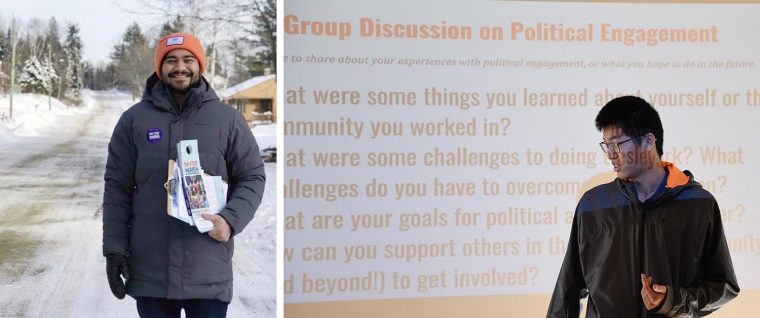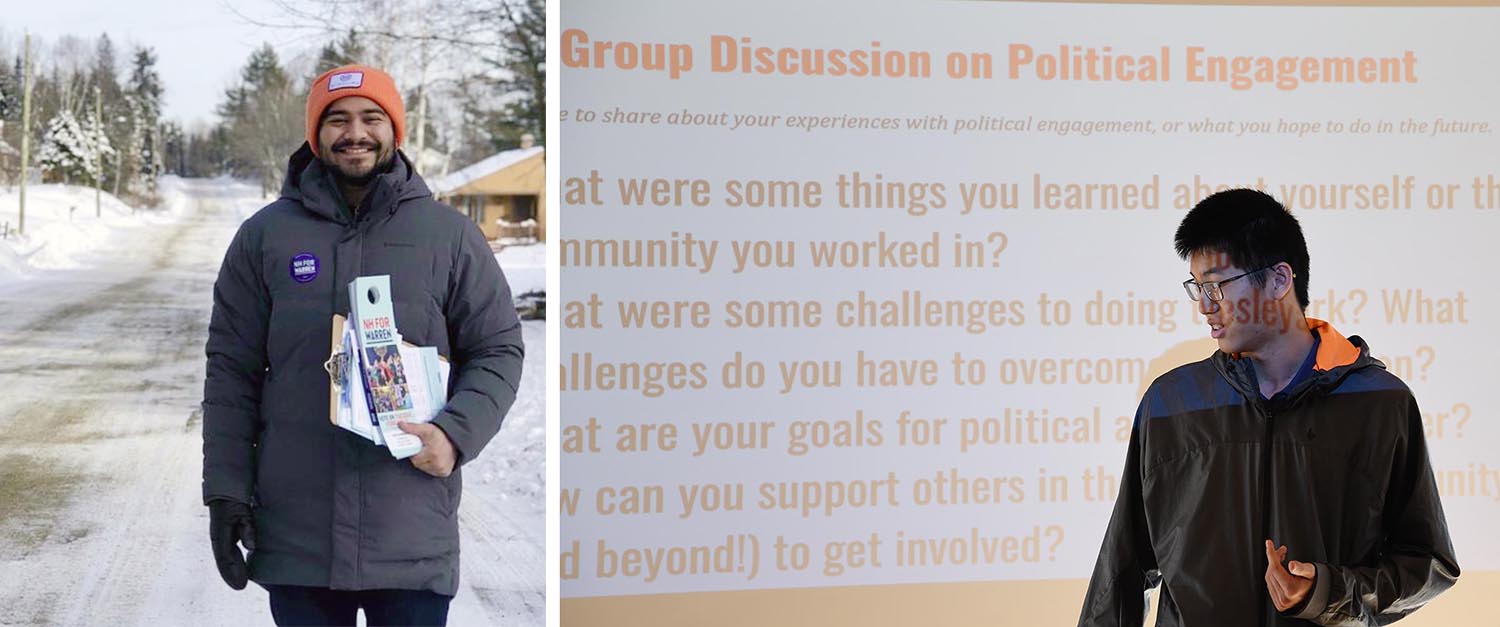Students Seek to Make Electoral Impact Through Political Engagement Fund


As we approach Election Day 2021 and look toward the 2022 midterm elections, Wesleyan continues its push to get students more civically involved. Wesleyan saw much success with its original Wesleyan Engage 2020 Initiative Fund and hopes to build on that momentum for next year, with enrollment for the Student Political Engagement Fund now open.
Through Wesleyan’s ongoing support of student learning through engaging the electoral process, students have found a variety of ways to get involved in the political process.
Working on a sheriff’s campaign in Georgia. Supporting a New York City Council race. Canvassing in small-town Connecticut elections. Registering voters. Lobbying against fracking. Wesleyan students have found a variety of interesting ways to get involved and make an impact on what is important to them.
The Political Engagement Fund is a non-partisan effort to support student civic engagement. Fund recipients receive grants to support costs associated with lodging, meals, software, supplies and more. About 50 students have taken part in the program over the past several years.
“They are supporting local or national campaigns and voter registration efforts. In some cases, they are doing issues or advocacy group,” said Clifton Watson, director of the Jewett Center for Community Partnerships. “There is no better way to learn about the electoral process than to engage in it.”
The fund also is an effort to help provide opportunities for students who might not ordinarily be engaged in the political process. “Something we hear often is that students wouldn’t have been able to have these experiences were it not for the fund. Often these experiences are unpaid and students aren’t able to take the time off of work to do it. It’s really important because it is introducing this work to a whole new generation of folks,” said Rhea Drozdenko, Coordinator of Community Participation.
As part of its emphasis on the importance of civic engagement, Wesleyan makes a concerted effort to make it easy for students to vote. Students are able to go to Beckham Hall to register to vote in Middletown. If students want to vote in their home state, Diana Martinez and her team make sure they have the right applications, postage, and envelopes.
Being patient with the minutiae of the voter registration process can be difficult for some students. Young people weaned on the immediacy of social media often have a hard time with the glacial pace of government. “Voting access and voting technology has not kept up to where this generation of students are at technologically speaking, so needing to address and stamp an envelope is not a process they’d normally need to follow to submit an application,” said Martinez, assistant director, Jewett Center for Community Partnerships.
Despite some challenges, outreach efforts on campus have been successful. Martinez said that approximately 80 percent of Wesleyan students vote in some capacity, whether in Middletown or in their home communities.
The opportunities for learning are profound. Watson recalled a student whose project was door knocking in New Hampshire during the 2020 presidential election. “They were struck by the variety of ways people enter the political process and the variety of political interests that were expressed by those who opened the door,” Watson said. “In a lot of cases, students might see the same range in their own social circles. They learn the diversity of perspective and interests represented by some folks.”
Still other students come from abroad and use the opportunity the fund provides to learn about the American political process and how what is done in America can inform what happens back in their home countries.
Most of students involved in the program don’t necessarily go into politics, Watson said. Of course, some do, but others become teachers, work in finance, or just decide that a life in politics is not for them. What every student leaves with is a greater understanding of how the political process works and how important it is to get involved.
“We are publicly reaffirming the role that institutions of higher learning play in terms of leadership development, but also in terms of encouraging student involvement in the electoral process,” Watson said.
Read more:
E2020 Experiences Shape Students’ Views of the Election
Students Join Political Campaigns, Organizations for Summer E2020 Initiative
Dancey Engages Students in Elections Research, E2020 Initiative
Motlagh ’20 Volunteers for Campaign in Rural N.H. as Part of E2020 Project
Watch Engage 2020 Speaker Series
Students Discuss Recent Engage 2020 Experiences

